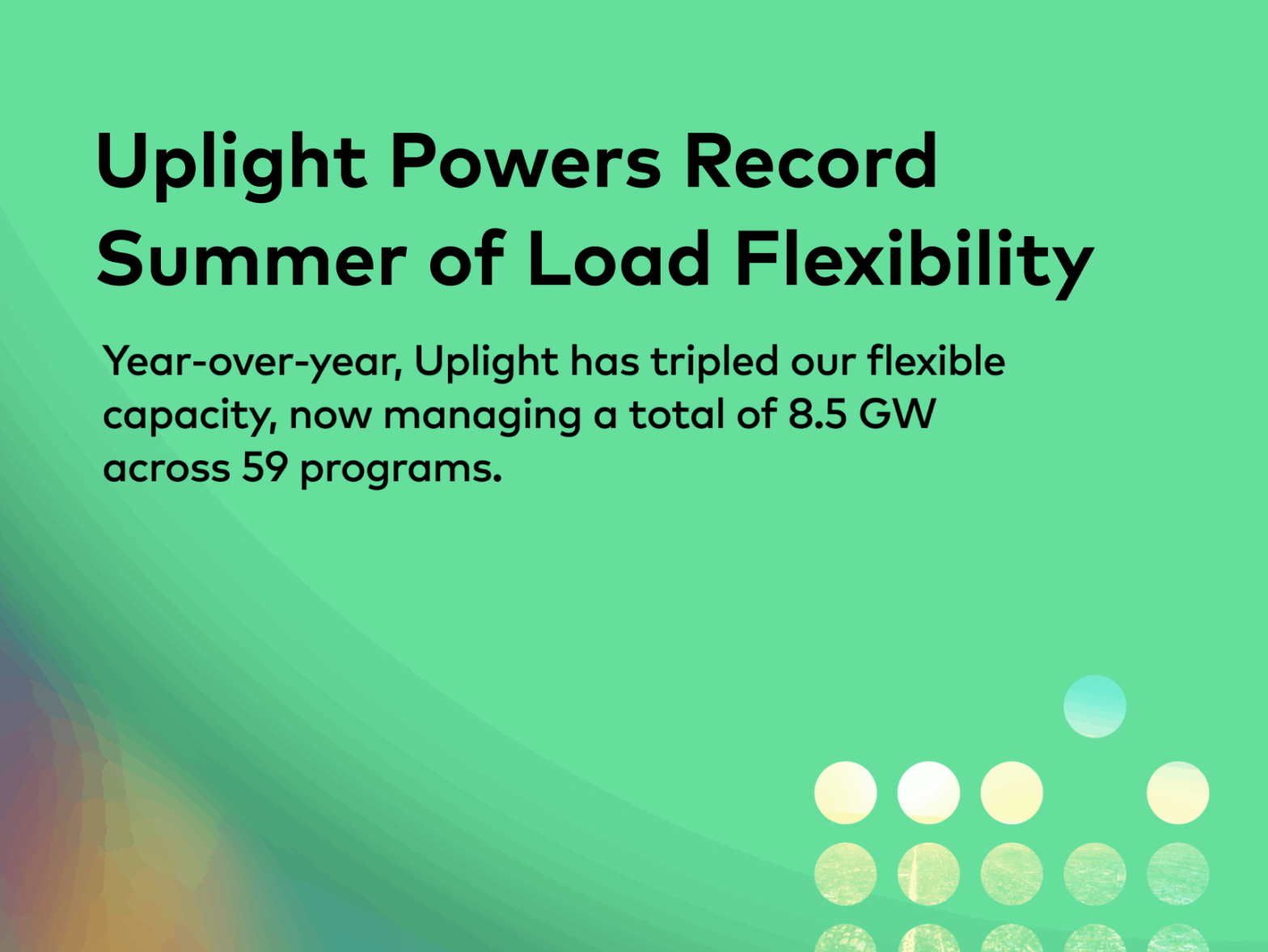Being a Certified B Corp is core to Uplight as a company and not many people know what a comprehensive and involved process it is. At Uplight, this work is shared cross-departmentally and led by Uplighters who are passionate about being a B Corp.
I sat down with Momo Nakamura, Senior Customer Growth & Marketing Operations Manager, and Nate Stein, Senior Corporate Responsibility Manager, to better understand why Uplight became a B Corp, what the certification (and recertification) process is like, and how it has shaped Uplight as a company.
Tell me about why Uplight decided to become a B Corp, and when the company did so.
Nate: Simple Energy, a company that merged with Tendril to form Uplight in 2019 (along with 4 other companies), had been a certified B Corp for 6 years, and the leadership team decided that certifying Uplight as a B Corp was non-negotiable.
Uplight was created with the understanding that the company must do good first and by doing good the business would have the ability to succeed. Through his experience at Simple Energy, Justin Segall (one of the founders of Uplight) understood how much more beneficial it was to utilize the standards set by B Lab to help a company succeed in doing well for society and the environment as opposed to attempting to do it on their own.
Momo: At Uplight, we live our purpose by being a purpose-driven business that utilizes business as a force for good–a business that benefits all stakeholders, not just shareholders. B Lab’s declaration of interdependence was something that resonated deeply with our leadership team. The declaration states the following:
- That we must be the change we seek in the world.
- That all business ought to be conducted as if people and place mattered.
- That, through their products, practices, and profits, businesses should aspire to do no harm and benefit all.
How often do companies go through recertification? What does the process involve? Who was involved?
Momo: Following the initial certification, B Lab requires B Corps to recertify every three years. The recertification process includes the completion and submission of a B Impact Assessment (BIA). The questions within the BIA vary depending upon the industry sector the business belongs to. The BIA for Uplight consisted of approximately 160 questions broken down into 5 categories: Community, Workers, Environment, Governance, and Customers.
After the completion of the BIA a member of B Lab will audit and verify the answers and provide a ‘score’—if the score is above 80, then you become a certified (recertified) B Corp. The entire process can take between 6-12 months from start to finish. At Uplight, we decided to give ourselves ample time to complete and submit the assessment and set aside 10 months.
Nate: How a company goes about completing the assessment likely varies by company size, organizational structure, and budget. Here at Uplight we assigned three project managers to distribute accountability across different departments since B Corp is an all-company initiative.
We put a lot of emphasis on making sure that we identified all key stakeholders from each business department. The assessment consists of questions that address the entire company, from the finance team to the people team to marketing. By identifying who from which department was going to be a part of this recertification project, we had a clear path for gathering documents and accurate and complete answers. We also had a clear communication channel and regular check-ins to keep everyone accountable and create space for any questions.
[Note: the assessment process is changing starting in 2023. More on that here]
How was this assessment different from the last one?
Nate: The assessment differed this time around for a couple of reasons. Firstly, we changed the category in which Uplight would be audited and certified from “Wholesale/Retail” to “Services with Minor Environmental footprint”. The change was necessary as our software business has grown since the last assessment. This change also better aligned our assessment questions with our industry, enabling us to provide more complete answers which would impact our overall B Impact score.
Momo: Also, it is important to add that when we first got certified in 2019 the process was completed within several months by only a few Uplighters—it is incredible that a small, dedicated team was able to complete this in such a short timeframe; but we also heard it was incredibly stressful. We wanted to make sure that for this round, we gave ourselves plenty of time so it doesn’t add to any additional work-related stress, and also that everyone at the company had the opportunity to help if interested.
What areas did Uplight increase impact in since this last assessment and how?
Nate: While we won’t officially know until B Labs audits and verifies our answers, we feel that our impact grew the greatest in the Workers and Communities sections. Over the last couple of years, Uplight has invested tremendously in programs to ensure diversity, equity, inclusion, and belonging are at the forefront, as well as making sure Uplighters are paid competitively. We have growth opportunities and training workshops to enhance our workplace. We’ve listened to working parents and have adjusted benefits to include Dependent Care FSA. We’ve incorporated Flex Fridays every other week, which have supported employees to recharge their batteries and carve out time for deep work. These are just some of the ways in which we’ve invested in employee engagement and health.
Momo: We also didn’t have many policies established yet around engaging with our communities, whether that is through volunteering or vendor relations. Since then, we’ve published many guidelines on responsible sourcing and purchasing, for example, we have a policy on prioritizing vendor and supplier relations to ensure we support MWVBE. Additionally, we have recently expanded our volunteer opportunities by establishing TeamUP! which was designed to help build connections between team members and the community by partnering with nonprofits.
How has being a B corp changed the way Uplight operates and the culture?
Nate: I appreciate that all of our company-wide meetings open with a reminder of our purpose “To Create a More Sustainable Future Using Business as a Force for Good“. It’s a wonderful opportunity to pause for a moment and remind ourselves why we do the work we do. We have our company goals and current initiatives, but our purpose becomes our guiding principle at Uplight, which we can all look towards.
Momo: And as a B Corp, it also helps us attract and retain top-tier talent who are personally dedicated to environmental and social good, which then adds to our culture. Employees are proud to work for a B Corp.
Is there anything else interesting that you encountered along the way?
Momo: As a Certified B Corp, Uplight is committed to using our business as a force for good by powering the clean energy transformation. We have continuously put a lot of effort into increasing our impact across our community, people, customer base, and the environment throughout the years, which I believe will show via our score increase from this recertification process.
But there is always more that we can do! And going through the assessment project as one of the project managers made me see all the additional ways in which Uplight can continue to better our workplace, give back to our communities and customers, and minimize our impact on the environment. I am excited to use the assessment questions as a guide to see what additional improvement areas we can focus on between now and our next assessment in 2025!




